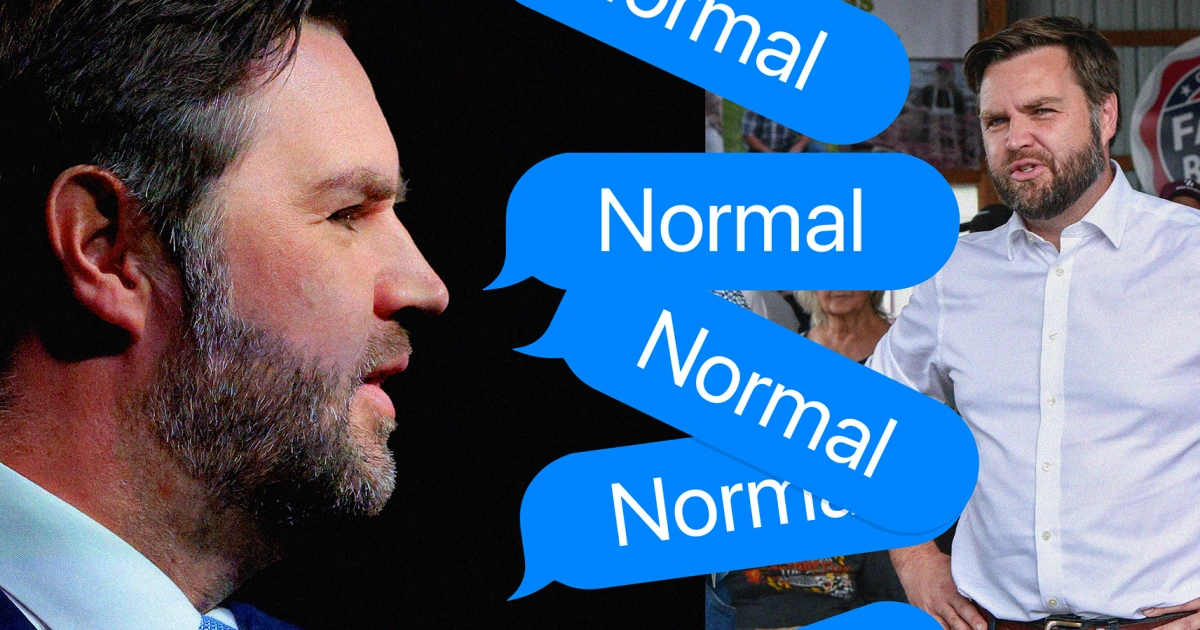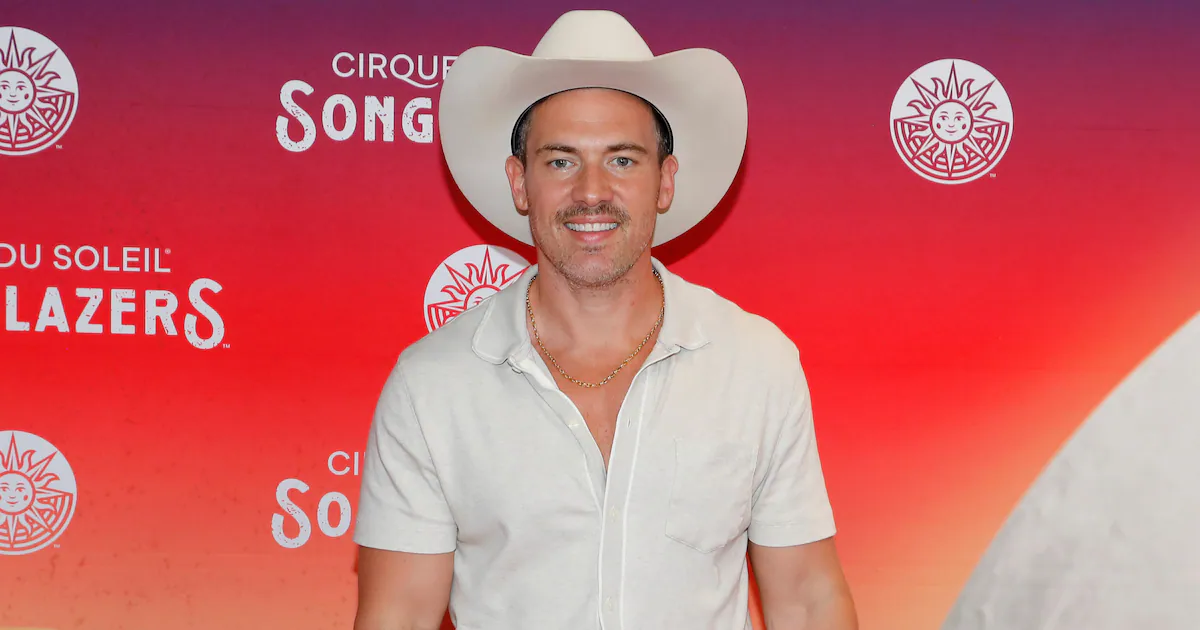
Vice President JD Vance could hardly mask his delight.
Four minutes into his appearance on the conservative podcast “Ruthless” this summer, one of the co-hosts pronounced him a “really cool and normal guy.” With a twinkle in his eye, Vance turned toward the camera.
“Thank you!” he replied. “We can wrap the interview now.”
It was a revealing moment. Vance, 41, has spent so much of his life, from his traumatic upbringing in Ohio to his elite education at an Ivy League law school, striving for normalcy. It was also validation for someone whom Democrats have tried to brand as precisely the opposite of normal — as weird.
“I mean, define normal,” Vance’s aunt Lori Meibers, who, along with his maternal grandparents, helped raise him, said in an interview with NBC News. “JD didn’t have what I would consider a normal childhood. There were different men in and out of his life, different situations. But one thing that he did have normal, which was a constant, was my mom and dad and family.”
Vance’s essays and speeches over the years, including those from before the “weird” attacks began, are filled with hosannas to “normal” people, places and things. In his voice, the word is not a rhetorical crutch or verbal tic, but rather a North Star and platonic ideal. It’s a message that guides his political worldview — economic populism that he champions explicitly for “normal Americans.”
It can also translate as a value judgment, like the time he talked about a Democratic Party run by “childless cat ladies“ that he described as an impediment to those who “want to have a normal life.”
The running list of who and what Vance finds normal includes President Donald Trump — “a very warm and normal person,” he said last fall at a Moms for America event. That same month, Vance predicted to podcaster Joe Rogan that he and Trump could win “the normal gay guy vote.”
Vance has also observed, with some detectable surprise, that progressive actor Cynthia Nixon plays “sort of a normal human being” on the HBO series “The Gilded Age.” And on “Ruthless,” he waded into the recent cultural uproar over Sydney Sweeney: “A normal, all-American, beautiful girl doing like a normal jeans ad, right?”
Vance leaned into the construct again last month, theorizing on Fox News that the suspect in the assassination of conservative activist Charlie Kirk had been led astray from a “normal” life.
“This is a person,” Vance said, “who grew up in a pretty normal family, actually had a pretty good home life, who was radicalized by the far left, by the social networks of the far left, by the ideas of the far left, and got so far down the path of radicalization that he killed my friend.”
Prosecutors said the suspect, Tyler Robinson, targeted Kirk because of his “political expression,” but investigators have yet to find a link between the shooting and left-wing groups.
What’s normal — or what isn’t — is often a subjective measure, and Vance’s measure isn’t all-inclusive. His views on day care and divorce, informed by his own experiences, evoke more old-fashioned family values and have opened him up to criticism. On several occasions, he has lashed out at those whose values don’t align with his, from Ukrainian President Volodymyr Zelenskyy to New York mayoral candidate Zohran Mamdani, by dismissing them as peculiarly ungrateful.
But Vance, said Meibers and a dozen others close to him, including friends and people who have worked with him, is firmly and authentically living his version of normal.
“I think that’s honestly one of the reasons why he and I really bonded pretty early in our term,” said Sen. Eric Schmitt, a Missouri Republican who, like Vance, was elected to the Senate in 2022. “We were just sort of normal guys, having normal conversations about things that people in real life talk about. And I think sometimes in Washington, sadly, that’s kind of rare.”
Vance’s friends say he makes an effort to avoid politics when texting or socializing, preferring instead to talk about their kids or Ohio State football. But Vance also values their opinions. When preparing for the vice presidential debate last year, he and his wife, Usha, invited several of them to participate and offer perspective he might not have otherwise heard from the professionals in the room, a person involved in the sessions said.
Cullen Tiernan, who has been friends with Vance since they served together in the Marines, said that although they are on opposite sides of the political spectrum, they have had constructive discussions about their differences.
“I’m more to the left, politically, but he’s somebody I’ve enjoyed learning from in so many different ways,” Tiernan added. “I always say I hope I influenced him a little bit, too.”
Tiernan, who lives in New Hampshire, recalled how Vance met up with him and his friends at a Brazilian steakhouse last year after campaigning for Trump ahead of the state’s first-in-the-nation presidential primary.
“He took off the MAGA hat,” Tiernan said, “and just very much blended right into Manchester, New Hampshire.”
From one world to another
Growing up in Middletown, Ohio, Vance chased his idea of normal life.
His 2016 memoir, “Hillbilly Elegy,” chronicled his mother’s struggle with drug addiction and other family crises. In one chapter, he recalled how “Mom and Bob” — her third husband — “weren’t that abnormal.” In another, he wrote about the summer he briefly lived with his father, who left him and his mom when Vance was a toddler.
“His life,” Vance noted, “was normal in precisely the way I’d always wanted mine to be.”
Eventually, Vance found his way. He enlisted in the Marines and later enrolled at Ohio State University — “a very normal thing for people from Ohio to do,” as one longtime friend from Middletown observed.
But the left has goofed on elements of Vance’s youth to feed the narrative that he is weird. One social media meme compares a photo of a dashing young Gavin Newsom, the Democratic governor of California and potential Vance rival in 2028, to one of a grungier Vance from his high school yearbook.
“JD was a very awkward teenager and had, obviously, some issues on the home front, and that maybe came out in some of his hairstyles and his dress,” Tiernan recalled thinking after seeing the meme. “But to me, that is more the real experience of people in normal America.”
Vance also wrestled with his identity in his early days at Yale Law School.
“I am an Appalachian white boy in style and disposition, but I’ve just begun training at the world’s premier center for elites,” he wrote in a September 2010 blog entry after beginning his studies there. “So I come from one world and I’m joining a bizarrely different one, and I don’t know what to think about it.”
Law school was a culture shock. A memorable scene in “Hillbilly Elegy” involves Vance calling Usha, whom he met at Yale, to ask which fork to use first at a fancy dinner put together by a prestigious law firm.
“We used to laugh about some of his new friends that he’d met at Yale,” Meibers said. “He would tell stories, and we’d be like, ‘Are you serious?’ You know … how pretentious they were.”
“I think it taught him the value of being true to yourself, even if all the others around you are very different,” she added. “That’s kind of who JD is. He can fit in any world.”
A law school classmate recalled Vance quickly adapting to his new surroundings while maintaining “incredibly close ties” with his family back in Ohio.
“I remember his sister came to visit him in New Haven,” said the classmate, who was granted anonymity because their job prevents them from being quoted by name. “He proudly showed her off at the law school, introducing her to the professors he was close with, and to all his friends.”
A weird, strange political trip
With a new job in venture capital and a memoir about to climb the bestseller lists, Vance began a 2016 essay for The Atlantic by writing of brunches and wine tastings — a “perfectly normal day” in San Francisco.
The piece, which today is remembered more for Vance’s description of Trump as “cultural heroin,” continued with a contrast: “That very same Saturday, in the small Ohio town where I grew up, four people overdosed on heroin. A local police lieutenant coolly summarized the banality of it all: ‘It’s not all that unusual for a 24-hour period here.’ He was right: in Middletown, Ohio, that too is a perfectly normal day.”
Vance’s transition to politics, from Trump-skeptical author to Trump-endorsed candidate, was quick and unusual. His successful 2022 Senate bid in Ohio established how eager he was to build a consensus around his image of stability and normalcy.
There was his rationale for running: “I think that normal people in this country, people who want to live a good life, who just want to raise their families, they deserve somebody who fights for them,” he told Spectrum News in a 2021 interview.
There was also his “childless cat ladies” rant — a relative blip in the race’s early days — and his response to an LGBTQ group celebrating International Pronoun Day: “I’ll just speak like a normal person instead.”
Soon after winning the Senate seat, Vance had the opportunity to make “normal” a national sales pitch. Voters, he said in his first public remarks once Trump selected him as his running mate last year, “know that when [Trump] was president for four years, groceries and gas and energy and housing were actually affordable to a normal person in this country.”
Within days of Vance’s nomination for vice president, Democrats dug into the old “cat ladies” comments, characterizing them as an example of his extreme views. And Minnesota Gov. Tim Walz pioneered the talking point that Vance is “weird” — a line that would stick with many on the left and nudge Kamala Harris toward selecting him for the No. 2 spot on her ticket.
“Such a weird attack line, because it’s not true,” said Schmitt, Vance’s former Senate colleague. “I would tell people when he was picked, ‘You’re going to love JD Vance. He’s a normal guy.’”
For his part, Vance remained sharply on message.
When Trump took heat for questioning Harris’ racial identity, Vance defended him by calling Harris “a person who switches identity like a normal person changes their clothes.” And when CNN’s Dana Bash asked Vance to respond to Walz’s “weird” attacks, Vance mocked him for how he had embraced his wife at a campaign event.
“I remember when I had just been announced as a VP nominee,” Vance said. “I gave my big speech and I saw my wife and I gave her a big hug and a kiss, because I love my wife and I think that’s what a normal person does.”
‘They were dancing in the kitchen’
Usha Vance understands how flexible and fragile this all can be.
“To me, the highest priority right now is to be actually a normal person,” the second lady told The Free Press, a right-leaning news organization, in April.
At the same time, she confessed: “Obviously, our lives are not normal, and it feels almost absurd to say that they are.”
Friends say that Vance works hard to balance the new demands on his time as vice president with his need to maintain the normal home life that has been important to him since growing up without one.
“It wasn’t too long ago I read something where JD and Usha were having problems,” said Meibers, Vance’s aunt. “I just laughed, because I thought, ‘You know, what’s so funny? I literally just left them 15 minutes ago, and they were dancing in the kitchen.’”
That’s not to say it has been easy as he and Usha raise their three young children under the profoundly abnormal political spotlight — hecklers disrupted a trip to Disneyland, for example. Meibers said the family feels most comfortable at their house in Cincinnati, not on the grounds of the U.S. Naval Observatory, where the vice president’s official residence sits.
When they can, they bring the comforts of home with them. Schmitt recalled visiting Vance at the residence over the summer, around the time the Senate was working to pass the Trump-backed One Big Beautiful Bill Act. Vance, who was on standby to cast the tiebreaking vote, slipped outside with the kids at dusk to release some lightning bugs they had caught in Ohio.
“As much as he’s doing the whirlwind tours and being the vice president of the United States, that stuff is very important to him,” Schmitt said.
Then there’s the political question. Can Vance, the early front-runner for the Republican nomination in 2028, successfully advance his vision of normal on a larger scale? Running as Trump’s heir apparent, he would in some ways be selling the idea of keeping America normal.
During a June appearance on “This Past Weekend with Theo Von” — a so-called “manosphere” podcast popular with the young, male voters who helped carry Trump and Vance to victory last year — Vance marveled at how Trump “is in touch with normal people.” When making decisions, Vance said, the president listens to everyone from “the gardener at Mar-a-Lago” to “people who work in the kitchen at the White House.” On the episode’s YouTube page, several commenters remarked on how “normal” Vance was himself.
“Maybe the most normal person in politics, and his opponents are scared to death because they don’t have anybody who can compete on those terms,” said Republican operative John Ashbrook, a co-host of the “Ruthless” podcast and, like Vance, a Cincinnati-area native.
But Vance also might have to persuade voters turned off by Trump — voters who might not fit Vance’s definition of normal. Meibers believes her nephew will find ways to relate to those who don’t share his views, pointing to the adversity he overcame and how he learned forgiveness at an early age.
“When we see JD on TV, it’s so funny to us, because I don’t know if we’ll ever get used to it,” she said. “But he’s still the JD that we see in the living room. His little mannerisms, and the things he says, and what he stresses. And I think that’s it. When JD talks about wanting people to see him as a normal person, it’s because he is.”



